Analysis of Entertainment Industry and Venue Management in the UK
VerifiedAdded on 2020/01/15
|11
|3369
|434
Report
AI Summary
This report provides a comprehensive analysis of the entertainment industry and venue management, focusing on the United Kingdom. It delves into the industry's contribution to the UK's economy, comparing various funding agencies and their impact on the sector. The report explores the scope of both the entertainment and venue industries, examining the creative sector, music industry, sports and events, and media. It also classifies entertainment activities based on audience profile and venue type. Furthermore, the report compares the management and operational strategies of the London Olympic venue and the British Museum, highlighting differences in their approaches to strategy formulation, goal setting, and implementation. The report concludes with an evaluation of different areas of work and responsibilities within the entertainment and venue management industries, providing valuable insights into the dynamic nature of this growing sector.

ENTERTAINMENT
INDUSTRY AND VENUE
MANAGEMENT
INDUSTRY AND VENUE
MANAGEMENT
Paraphrase This Document
Need a fresh take? Get an instant paraphrase of this document with our AI Paraphraser

TABLE OF CONTENTS
INTRODUCTION...........................................................................................................................1
TASK 1............................................................................................................................................1
1.1 Analysis of the Entertainment Industry.................................................................................1
1.2 Comparing various funding agencies and their impact on the industry................................2
TASK 2............................................................................................................................................3
2.1 Comparing the scope of entertainment and venue industry..................................................3
TASK 3............................................................................................................................................5
3.1 Comparing management and operational strategies of the London Olympic venue and the
British museum...........................................................................................................................5
3.2 Evaluation of different areas of work and responsibilities....................................................6
TASK 4............................................................................................................................................6
CONCLUSION................................................................................................................................6
REFERENCES ..............................................................................................................................7
INTRODUCTION...........................................................................................................................1
TASK 1............................................................................................................................................1
1.1 Analysis of the Entertainment Industry.................................................................................1
1.2 Comparing various funding agencies and their impact on the industry................................2
TASK 2............................................................................................................................................3
2.1 Comparing the scope of entertainment and venue industry..................................................3
TASK 3............................................................................................................................................5
3.1 Comparing management and operational strategies of the London Olympic venue and the
British museum...........................................................................................................................5
3.2 Evaluation of different areas of work and responsibilities....................................................6
TASK 4............................................................................................................................................6
CONCLUSION................................................................................................................................6
REFERENCES ..............................................................................................................................7
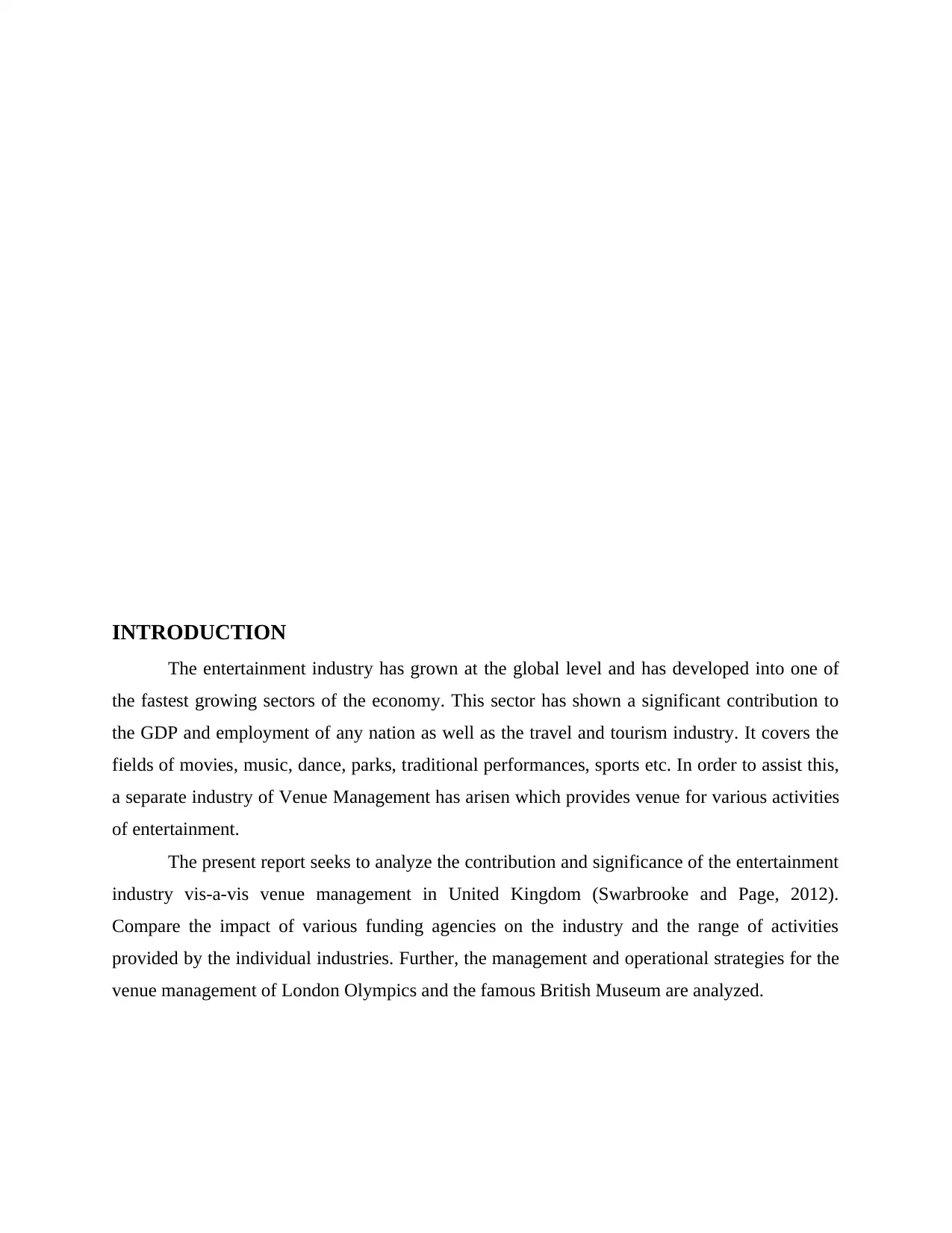
INTRODUCTION
The entertainment industry has grown at the global level and has developed into one of
the fastest growing sectors of the economy. This sector has shown a significant contribution to
the GDP and employment of any nation as well as the travel and tourism industry. It covers the
fields of movies, music, dance, parks, traditional performances, sports etc. In order to assist this,
a separate industry of Venue Management has arisen which provides venue for various activities
of entertainment.
The present report seeks to analyze the contribution and significance of the entertainment
industry vis-a-vis venue management in United Kingdom (Swarbrooke and Page, 2012).
Compare the impact of various funding agencies on the industry and the range of activities
provided by the individual industries. Further, the management and operational strategies for the
venue management of London Olympics and the famous British Museum are analyzed.
The entertainment industry has grown at the global level and has developed into one of
the fastest growing sectors of the economy. This sector has shown a significant contribution to
the GDP and employment of any nation as well as the travel and tourism industry. It covers the
fields of movies, music, dance, parks, traditional performances, sports etc. In order to assist this,
a separate industry of Venue Management has arisen which provides venue for various activities
of entertainment.
The present report seeks to analyze the contribution and significance of the entertainment
industry vis-a-vis venue management in United Kingdom (Swarbrooke and Page, 2012).
Compare the impact of various funding agencies on the industry and the range of activities
provided by the individual industries. Further, the management and operational strategies for the
venue management of London Olympics and the famous British Museum are analyzed.
⊘ This is a preview!⊘
Do you want full access?
Subscribe today to unlock all pages.

Trusted by 1+ million students worldwide
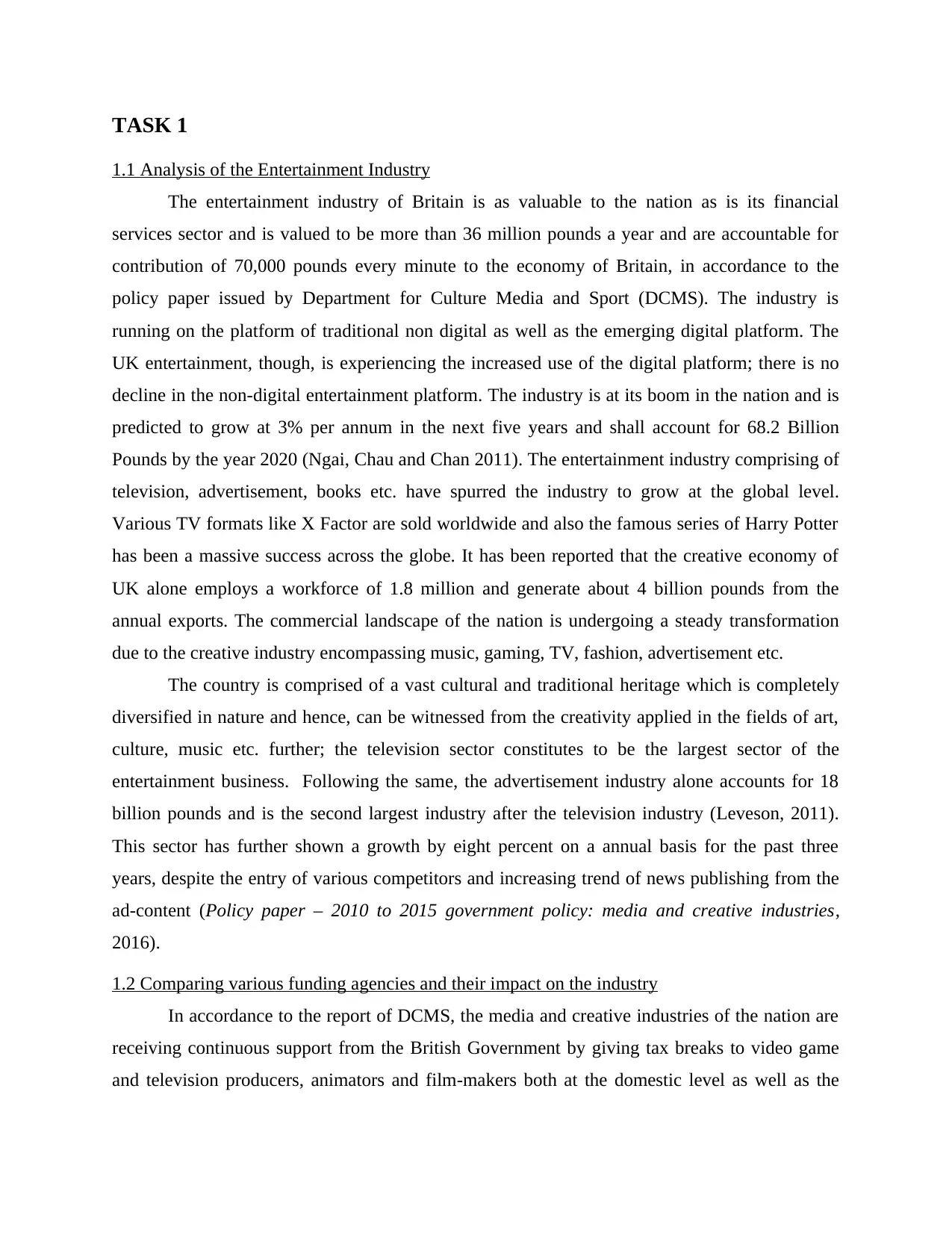
TASK 1
1.1 Analysis of the Entertainment Industry
The entertainment industry of Britain is as valuable to the nation as is its financial
services sector and is valued to be more than 36 million pounds a year and are accountable for
contribution of 70,000 pounds every minute to the economy of Britain, in accordance to the
policy paper issued by Department for Culture Media and Sport (DCMS). The industry is
running on the platform of traditional non digital as well as the emerging digital platform. The
UK entertainment, though, is experiencing the increased use of the digital platform; there is no
decline in the non-digital entertainment platform. The industry is at its boom in the nation and is
predicted to grow at 3% per annum in the next five years and shall account for 68.2 Billion
Pounds by the year 2020 (Ngai, Chau and Chan 2011). The entertainment industry comprising of
television, advertisement, books etc. have spurred the industry to grow at the global level.
Various TV formats like X Factor are sold worldwide and also the famous series of Harry Potter
has been a massive success across the globe. It has been reported that the creative economy of
UK alone employs a workforce of 1.8 million and generate about 4 billion pounds from the
annual exports. The commercial landscape of the nation is undergoing a steady transformation
due to the creative industry encompassing music, gaming, TV, fashion, advertisement etc.
The country is comprised of a vast cultural and traditional heritage which is completely
diversified in nature and hence, can be witnessed from the creativity applied in the fields of art,
culture, music etc. further; the television sector constitutes to be the largest sector of the
entertainment business. Following the same, the advertisement industry alone accounts for 18
billion pounds and is the second largest industry after the television industry (Leveson, 2011).
This sector has further shown a growth by eight percent on a annual basis for the past three
years, despite the entry of various competitors and increasing trend of news publishing from the
ad-content (Policy paper – 2010 to 2015 government policy: media and creative industries,
2016).
1.2 Comparing various funding agencies and their impact on the industry
In accordance to the report of DCMS, the media and creative industries of the nation are
receiving continuous support from the British Government by giving tax breaks to video game
and television producers, animators and film-makers both at the domestic level as well as the
1.1 Analysis of the Entertainment Industry
The entertainment industry of Britain is as valuable to the nation as is its financial
services sector and is valued to be more than 36 million pounds a year and are accountable for
contribution of 70,000 pounds every minute to the economy of Britain, in accordance to the
policy paper issued by Department for Culture Media and Sport (DCMS). The industry is
running on the platform of traditional non digital as well as the emerging digital platform. The
UK entertainment, though, is experiencing the increased use of the digital platform; there is no
decline in the non-digital entertainment platform. The industry is at its boom in the nation and is
predicted to grow at 3% per annum in the next five years and shall account for 68.2 Billion
Pounds by the year 2020 (Ngai, Chau and Chan 2011). The entertainment industry comprising of
television, advertisement, books etc. have spurred the industry to grow at the global level.
Various TV formats like X Factor are sold worldwide and also the famous series of Harry Potter
has been a massive success across the globe. It has been reported that the creative economy of
UK alone employs a workforce of 1.8 million and generate about 4 billion pounds from the
annual exports. The commercial landscape of the nation is undergoing a steady transformation
due to the creative industry encompassing music, gaming, TV, fashion, advertisement etc.
The country is comprised of a vast cultural and traditional heritage which is completely
diversified in nature and hence, can be witnessed from the creativity applied in the fields of art,
culture, music etc. further; the television sector constitutes to be the largest sector of the
entertainment business. Following the same, the advertisement industry alone accounts for 18
billion pounds and is the second largest industry after the television industry (Leveson, 2011).
This sector has further shown a growth by eight percent on a annual basis for the past three
years, despite the entry of various competitors and increasing trend of news publishing from the
ad-content (Policy paper – 2010 to 2015 government policy: media and creative industries,
2016).
1.2 Comparing various funding agencies and their impact on the industry
In accordance to the report of DCMS, the media and creative industries of the nation are
receiving continuous support from the British Government by giving tax breaks to video game
and television producers, animators and film-makers both at the domestic level as well as the
Paraphrase This Document
Need a fresh take? Get an instant paraphrase of this document with our AI Paraphraser
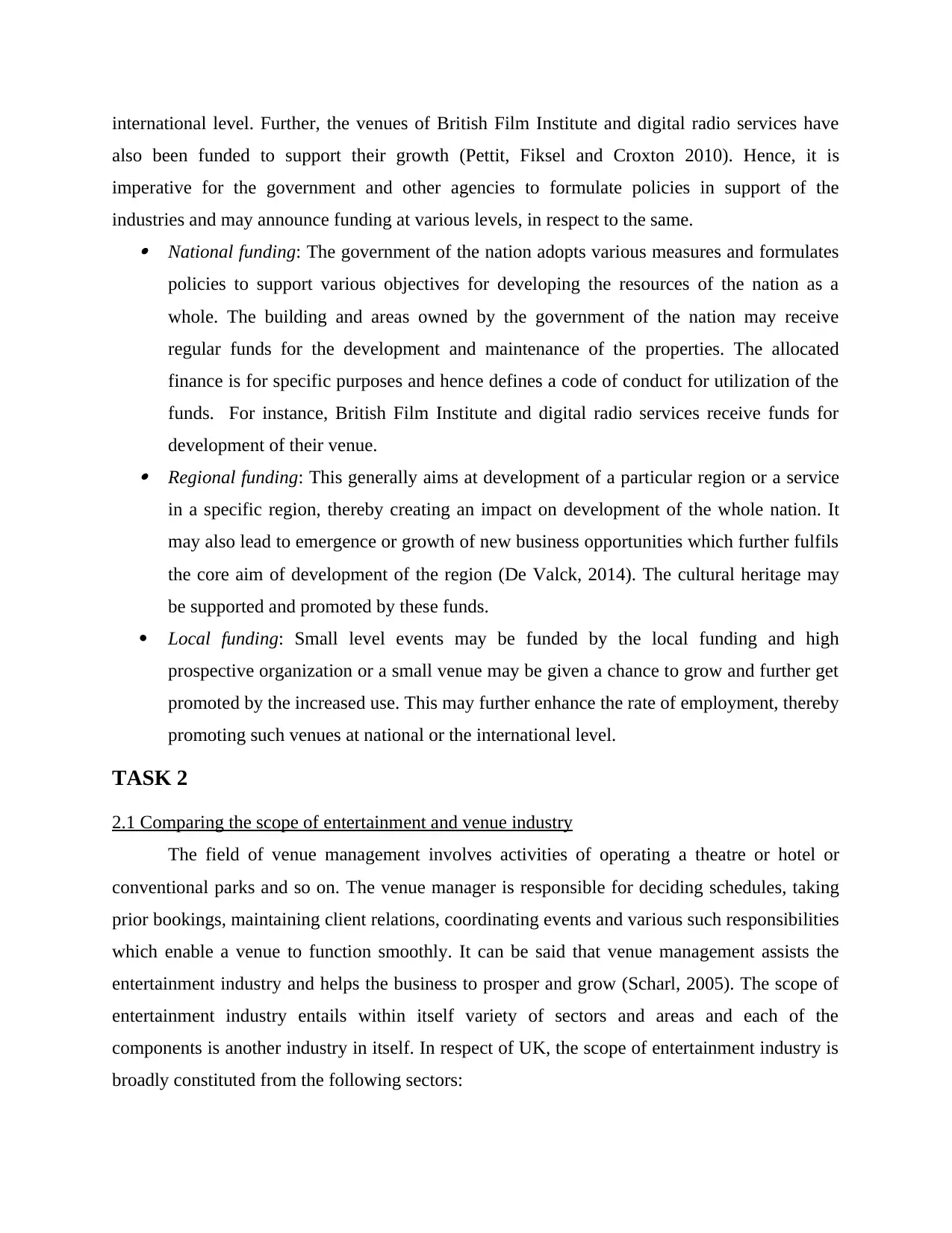
international level. Further, the venues of British Film Institute and digital radio services have
also been funded to support their growth (Pettit, Fiksel and Croxton 2010). Hence, it is
imperative for the government and other agencies to formulate policies in support of the
industries and may announce funding at various levels, in respect to the same. National funding: The government of the nation adopts various measures and formulates
policies to support various objectives for developing the resources of the nation as a
whole. The building and areas owned by the government of the nation may receive
regular funds for the development and maintenance of the properties. The allocated
finance is for specific purposes and hence defines a code of conduct for utilization of the
funds. For instance, British Film Institute and digital radio services receive funds for
development of their venue. Regional funding: This generally aims at development of a particular region or a service
in a specific region, thereby creating an impact on development of the whole nation. It
may also lead to emergence or growth of new business opportunities which further fulfils
the core aim of development of the region (De Valck, 2014). The cultural heritage may
be supported and promoted by these funds.
Local funding: Small level events may be funded by the local funding and high
prospective organization or a small venue may be given a chance to grow and further get
promoted by the increased use. This may further enhance the rate of employment, thereby
promoting such venues at national or the international level.
TASK 2
2.1 Comparing the scope of entertainment and venue industry
The field of venue management involves activities of operating a theatre or hotel or
conventional parks and so on. The venue manager is responsible for deciding schedules, taking
prior bookings, maintaining client relations, coordinating events and various such responsibilities
which enable a venue to function smoothly. It can be said that venue management assists the
entertainment industry and helps the business to prosper and grow (Scharl, 2005). The scope of
entertainment industry entails within itself variety of sectors and areas and each of the
components is another industry in itself. In respect of UK, the scope of entertainment industry is
broadly constituted from the following sectors:
also been funded to support their growth (Pettit, Fiksel and Croxton 2010). Hence, it is
imperative for the government and other agencies to formulate policies in support of the
industries and may announce funding at various levels, in respect to the same. National funding: The government of the nation adopts various measures and formulates
policies to support various objectives for developing the resources of the nation as a
whole. The building and areas owned by the government of the nation may receive
regular funds for the development and maintenance of the properties. The allocated
finance is for specific purposes and hence defines a code of conduct for utilization of the
funds. For instance, British Film Institute and digital radio services receive funds for
development of their venue. Regional funding: This generally aims at development of a particular region or a service
in a specific region, thereby creating an impact on development of the whole nation. It
may also lead to emergence or growth of new business opportunities which further fulfils
the core aim of development of the region (De Valck, 2014). The cultural heritage may
be supported and promoted by these funds.
Local funding: Small level events may be funded by the local funding and high
prospective organization or a small venue may be given a chance to grow and further get
promoted by the increased use. This may further enhance the rate of employment, thereby
promoting such venues at national or the international level.
TASK 2
2.1 Comparing the scope of entertainment and venue industry
The field of venue management involves activities of operating a theatre or hotel or
conventional parks and so on. The venue manager is responsible for deciding schedules, taking
prior bookings, maintaining client relations, coordinating events and various such responsibilities
which enable a venue to function smoothly. It can be said that venue management assists the
entertainment industry and helps the business to prosper and grow (Scharl, 2005). The scope of
entertainment industry entails within itself variety of sectors and areas and each of the
components is another industry in itself. In respect of UK, the scope of entertainment industry is
broadly constituted from the following sectors:
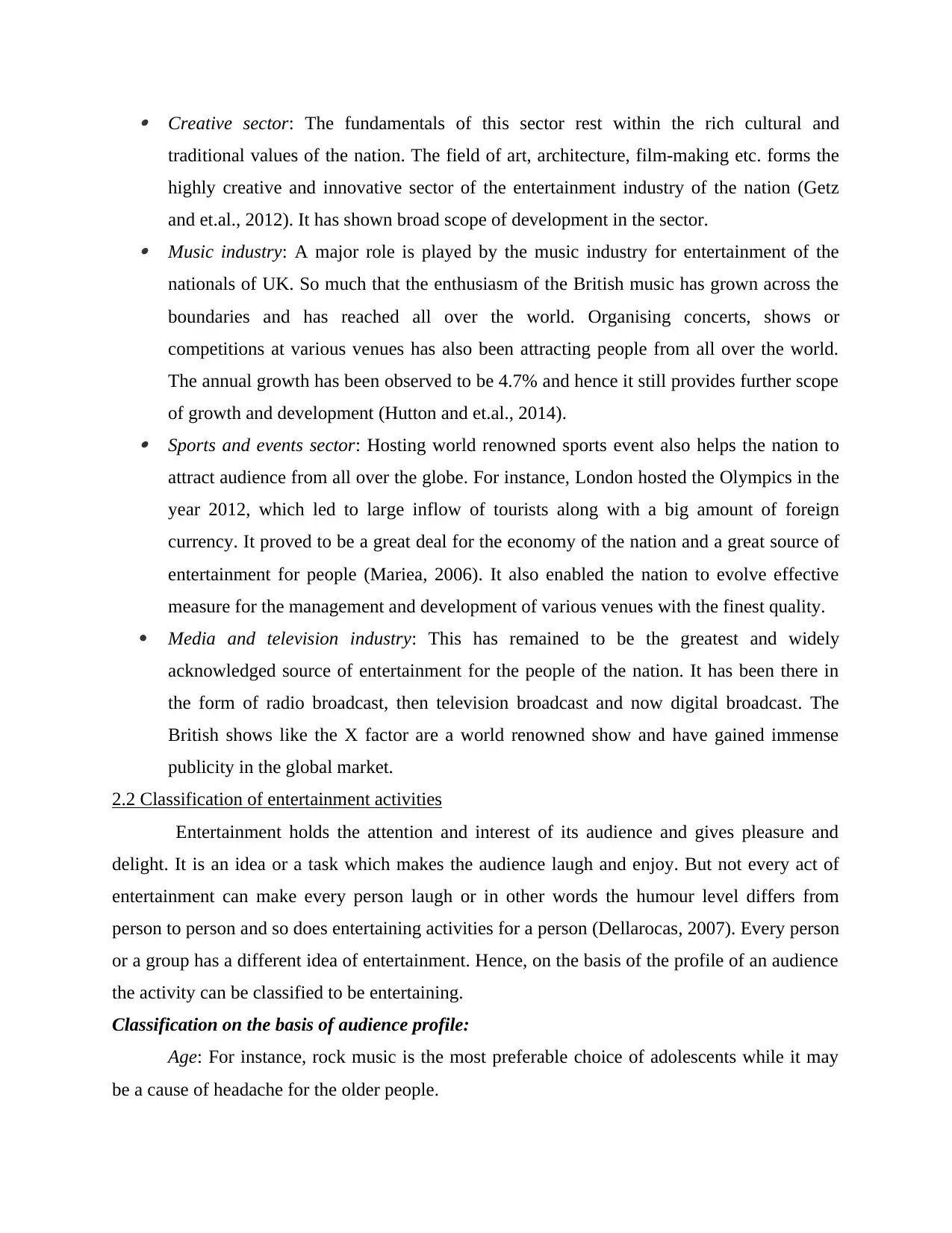
Creative sector: The fundamentals of this sector rest within the rich cultural and
traditional values of the nation. The field of art, architecture, film-making etc. forms the
highly creative and innovative sector of the entertainment industry of the nation (Getz
and et.al., 2012). It has shown broad scope of development in the sector. Music industry: A major role is played by the music industry for entertainment of the
nationals of UK. So much that the enthusiasm of the British music has grown across the
boundaries and has reached all over the world. Organising concerts, shows or
competitions at various venues has also been attracting people from all over the world.
The annual growth has been observed to be 4.7% and hence it still provides further scope
of growth and development (Hutton and et.al., 2014). Sports and events sector: Hosting world renowned sports event also helps the nation to
attract audience from all over the globe. For instance, London hosted the Olympics in the
year 2012, which led to large inflow of tourists along with a big amount of foreign
currency. It proved to be a great deal for the economy of the nation and a great source of
entertainment for people (Mariea, 2006). It also enabled the nation to evolve effective
measure for the management and development of various venues with the finest quality.
Media and television industry: This has remained to be the greatest and widely
acknowledged source of entertainment for the people of the nation. It has been there in
the form of radio broadcast, then television broadcast and now digital broadcast. The
British shows like the X factor are a world renowned show and have gained immense
publicity in the global market.
2.2 Classification of entertainment activities
Entertainment holds the attention and interest of its audience and gives pleasure and
delight. It is an idea or a task which makes the audience laugh and enjoy. But not every act of
entertainment can make every person laugh or in other words the humour level differs from
person to person and so does entertaining activities for a person (Dellarocas, 2007). Every person
or a group has a different idea of entertainment. Hence, on the basis of the profile of an audience
the activity can be classified to be entertaining.
Classification on the basis of audience profile:
Age: For instance, rock music is the most preferable choice of adolescents while it may
be a cause of headache for the older people.
traditional values of the nation. The field of art, architecture, film-making etc. forms the
highly creative and innovative sector of the entertainment industry of the nation (Getz
and et.al., 2012). It has shown broad scope of development in the sector. Music industry: A major role is played by the music industry for entertainment of the
nationals of UK. So much that the enthusiasm of the British music has grown across the
boundaries and has reached all over the world. Organising concerts, shows or
competitions at various venues has also been attracting people from all over the world.
The annual growth has been observed to be 4.7% and hence it still provides further scope
of growth and development (Hutton and et.al., 2014). Sports and events sector: Hosting world renowned sports event also helps the nation to
attract audience from all over the globe. For instance, London hosted the Olympics in the
year 2012, which led to large inflow of tourists along with a big amount of foreign
currency. It proved to be a great deal for the economy of the nation and a great source of
entertainment for people (Mariea, 2006). It also enabled the nation to evolve effective
measure for the management and development of various venues with the finest quality.
Media and television industry: This has remained to be the greatest and widely
acknowledged source of entertainment for the people of the nation. It has been there in
the form of radio broadcast, then television broadcast and now digital broadcast. The
British shows like the X factor are a world renowned show and have gained immense
publicity in the global market.
2.2 Classification of entertainment activities
Entertainment holds the attention and interest of its audience and gives pleasure and
delight. It is an idea or a task which makes the audience laugh and enjoy. But not every act of
entertainment can make every person laugh or in other words the humour level differs from
person to person and so does entertaining activities for a person (Dellarocas, 2007). Every person
or a group has a different idea of entertainment. Hence, on the basis of the profile of an audience
the activity can be classified to be entertaining.
Classification on the basis of audience profile:
Age: For instance, rock music is the most preferable choice of adolescents while it may
be a cause of headache for the older people.
⊘ This is a preview!⊘
Do you want full access?
Subscribe today to unlock all pages.

Trusted by 1+ million students worldwide
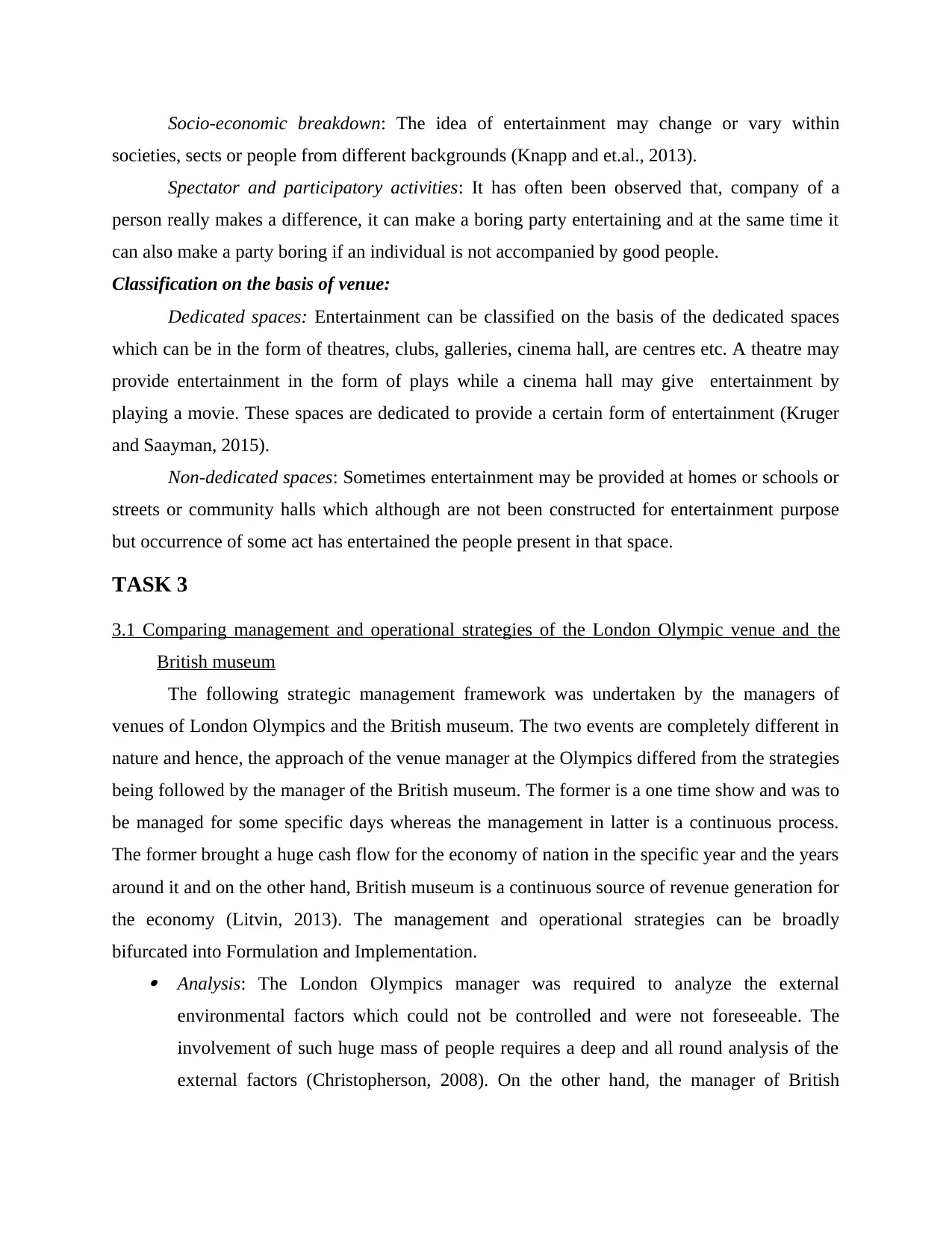
Socio-economic breakdown: The idea of entertainment may change or vary within
societies, sects or people from different backgrounds (Knapp and et.al., 2013).
Spectator and participatory activities: It has often been observed that, company of a
person really makes a difference, it can make a boring party entertaining and at the same time it
can also make a party boring if an individual is not accompanied by good people.
Classification on the basis of venue:
Dedicated spaces: Entertainment can be classified on the basis of the dedicated spaces
which can be in the form of theatres, clubs, galleries, cinema hall, are centres etc. A theatre may
provide entertainment in the form of plays while a cinema hall may give entertainment by
playing a movie. These spaces are dedicated to provide a certain form of entertainment (Kruger
and Saayman, 2015).
Non-dedicated spaces: Sometimes entertainment may be provided at homes or schools or
streets or community halls which although are not been constructed for entertainment purpose
but occurrence of some act has entertained the people present in that space.
TASK 3
3.1 Comparing management and operational strategies of the London Olympic venue and the
British museum
The following strategic management framework was undertaken by the managers of
venues of London Olympics and the British museum. The two events are completely different in
nature and hence, the approach of the venue manager at the Olympics differed from the strategies
being followed by the manager of the British museum. The former is a one time show and was to
be managed for some specific days whereas the management in latter is a continuous process.
The former brought a huge cash flow for the economy of nation in the specific year and the years
around it and on the other hand, British museum is a continuous source of revenue generation for
the economy (Litvin, 2013). The management and operational strategies can be broadly
bifurcated into Formulation and Implementation. Analysis: The London Olympics manager was required to analyze the external
environmental factors which could not be controlled and were not foreseeable. The
involvement of such huge mass of people requires a deep and all round analysis of the
external factors (Christopherson, 2008). On the other hand, the manager of British
societies, sects or people from different backgrounds (Knapp and et.al., 2013).
Spectator and participatory activities: It has often been observed that, company of a
person really makes a difference, it can make a boring party entertaining and at the same time it
can also make a party boring if an individual is not accompanied by good people.
Classification on the basis of venue:
Dedicated spaces: Entertainment can be classified on the basis of the dedicated spaces
which can be in the form of theatres, clubs, galleries, cinema hall, are centres etc. A theatre may
provide entertainment in the form of plays while a cinema hall may give entertainment by
playing a movie. These spaces are dedicated to provide a certain form of entertainment (Kruger
and Saayman, 2015).
Non-dedicated spaces: Sometimes entertainment may be provided at homes or schools or
streets or community halls which although are not been constructed for entertainment purpose
but occurrence of some act has entertained the people present in that space.
TASK 3
3.1 Comparing management and operational strategies of the London Olympic venue and the
British museum
The following strategic management framework was undertaken by the managers of
venues of London Olympics and the British museum. The two events are completely different in
nature and hence, the approach of the venue manager at the Olympics differed from the strategies
being followed by the manager of the British museum. The former is a one time show and was to
be managed for some specific days whereas the management in latter is a continuous process.
The former brought a huge cash flow for the economy of nation in the specific year and the years
around it and on the other hand, British museum is a continuous source of revenue generation for
the economy (Litvin, 2013). The management and operational strategies can be broadly
bifurcated into Formulation and Implementation. Analysis: The London Olympics manager was required to analyze the external
environmental factors which could not be controlled and were not foreseeable. The
involvement of such huge mass of people requires a deep and all round analysis of the
external factors (Christopherson, 2008). On the other hand, the manager of British
Paraphrase This Document
Need a fresh take? Get an instant paraphrase of this document with our AI Paraphraser
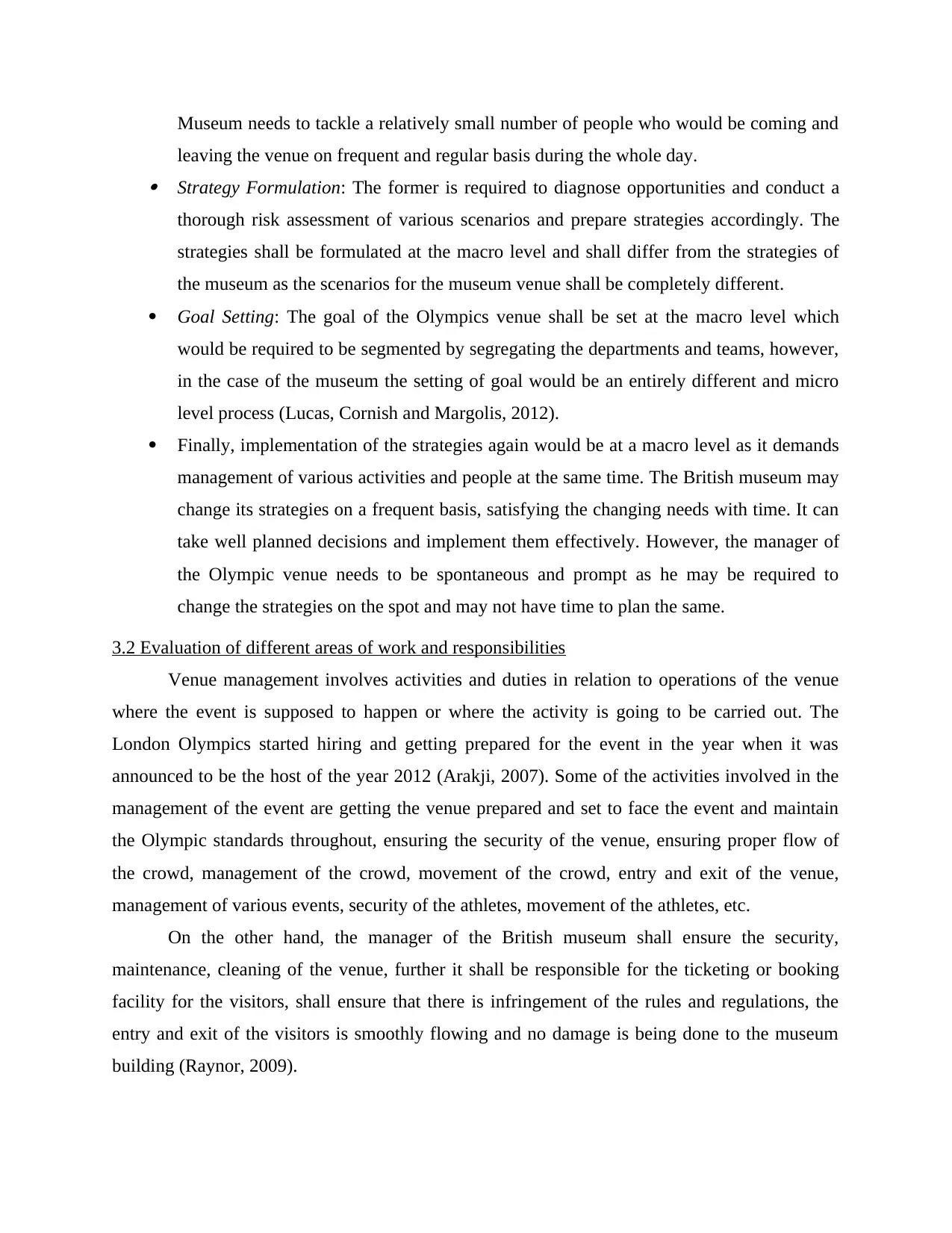
Museum needs to tackle a relatively small number of people who would be coming and
leaving the venue on frequent and regular basis during the whole day. Strategy Formulation: The former is required to diagnose opportunities and conduct a
thorough risk assessment of various scenarios and prepare strategies accordingly. The
strategies shall be formulated at the macro level and shall differ from the strategies of
the museum as the scenarios for the museum venue shall be completely different.
Goal Setting: The goal of the Olympics venue shall be set at the macro level which
would be required to be segmented by segregating the departments and teams, however,
in the case of the museum the setting of goal would be an entirely different and micro
level process (Lucas, Cornish and Margolis, 2012).
Finally, implementation of the strategies again would be at a macro level as it demands
management of various activities and people at the same time. The British museum may
change its strategies on a frequent basis, satisfying the changing needs with time. It can
take well planned decisions and implement them effectively. However, the manager of
the Olympic venue needs to be spontaneous and prompt as he may be required to
change the strategies on the spot and may not have time to plan the same.
3.2 Evaluation of different areas of work and responsibilities
Venue management involves activities and duties in relation to operations of the venue
where the event is supposed to happen or where the activity is going to be carried out. The
London Olympics started hiring and getting prepared for the event in the year when it was
announced to be the host of the year 2012 (Arakji, 2007). Some of the activities involved in the
management of the event are getting the venue prepared and set to face the event and maintain
the Olympic standards throughout, ensuring the security of the venue, ensuring proper flow of
the crowd, management of the crowd, movement of the crowd, entry and exit of the venue,
management of various events, security of the athletes, movement of the athletes, etc.
On the other hand, the manager of the British museum shall ensure the security,
maintenance, cleaning of the venue, further it shall be responsible for the ticketing or booking
facility for the visitors, shall ensure that there is infringement of the rules and regulations, the
entry and exit of the visitors is smoothly flowing and no damage is being done to the museum
building (Raynor, 2009).
leaving the venue on frequent and regular basis during the whole day. Strategy Formulation: The former is required to diagnose opportunities and conduct a
thorough risk assessment of various scenarios and prepare strategies accordingly. The
strategies shall be formulated at the macro level and shall differ from the strategies of
the museum as the scenarios for the museum venue shall be completely different.
Goal Setting: The goal of the Olympics venue shall be set at the macro level which
would be required to be segmented by segregating the departments and teams, however,
in the case of the museum the setting of goal would be an entirely different and micro
level process (Lucas, Cornish and Margolis, 2012).
Finally, implementation of the strategies again would be at a macro level as it demands
management of various activities and people at the same time. The British museum may
change its strategies on a frequent basis, satisfying the changing needs with time. It can
take well planned decisions and implement them effectively. However, the manager of
the Olympic venue needs to be spontaneous and prompt as he may be required to
change the strategies on the spot and may not have time to plan the same.
3.2 Evaluation of different areas of work and responsibilities
Venue management involves activities and duties in relation to operations of the venue
where the event is supposed to happen or where the activity is going to be carried out. The
London Olympics started hiring and getting prepared for the event in the year when it was
announced to be the host of the year 2012 (Arakji, 2007). Some of the activities involved in the
management of the event are getting the venue prepared and set to face the event and maintain
the Olympic standards throughout, ensuring the security of the venue, ensuring proper flow of
the crowd, management of the crowd, movement of the crowd, entry and exit of the venue,
management of various events, security of the athletes, movement of the athletes, etc.
On the other hand, the manager of the British museum shall ensure the security,
maintenance, cleaning of the venue, further it shall be responsible for the ticketing or booking
facility for the visitors, shall ensure that there is infringement of the rules and regulations, the
entry and exit of the visitors is smoothly flowing and no damage is being done to the museum
building (Raynor, 2009).
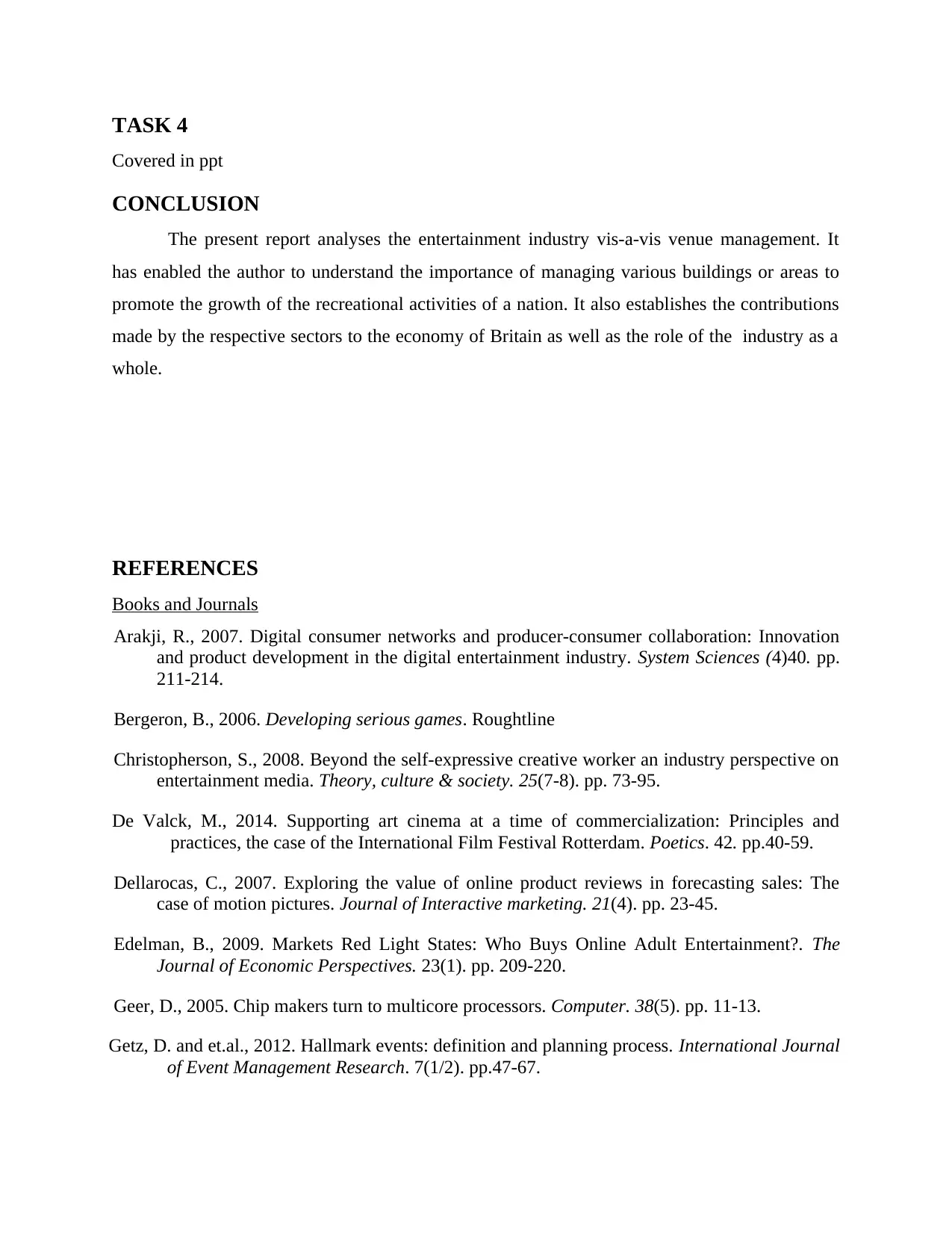
TASK 4
Covered in ppt
CONCLUSION
The present report analyses the entertainment industry vis-a-vis venue management. It
has enabled the author to understand the importance of managing various buildings or areas to
promote the growth of the recreational activities of a nation. It also establishes the contributions
made by the respective sectors to the economy of Britain as well as the role of the industry as a
whole.
REFERENCES
Books and Journals
Arakji, R., 2007. Digital consumer networks and producer-consumer collaboration: Innovation
and product development in the digital entertainment industry. System Sciences (4)40. pp.
211-214.
Bergeron, B., 2006. Developing serious games. Roughtline
Christopherson, S., 2008. Beyond the self-expressive creative worker an industry perspective on
entertainment media. Theory, culture & society. 25(7-8). pp. 73-95.
De Valck, M., 2014. Supporting art cinema at a time of commercialization: Principles and
practices, the case of the International Film Festival Rotterdam. Poetics. 42. pp.40-59.
Dellarocas, C., 2007. Exploring the value of online product reviews in forecasting sales: The
case of motion pictures. Journal of Interactive marketing. 21(4). pp. 23-45.
Edelman, B., 2009. Markets Red Light States: Who Buys Online Adult Entertainment?. The
Journal of Economic Perspectives. 23(1). pp. 209-220.
Geer, D., 2005. Chip makers turn to multicore processors. Computer. 38(5). pp. 11-13.
Getz, D. and et.al., 2012. Hallmark events: definition and planning process. International Journal
of Event Management Research. 7(1/2). pp.47-67.
Covered in ppt
CONCLUSION
The present report analyses the entertainment industry vis-a-vis venue management. It
has enabled the author to understand the importance of managing various buildings or areas to
promote the growth of the recreational activities of a nation. It also establishes the contributions
made by the respective sectors to the economy of Britain as well as the role of the industry as a
whole.
REFERENCES
Books and Journals
Arakji, R., 2007. Digital consumer networks and producer-consumer collaboration: Innovation
and product development in the digital entertainment industry. System Sciences (4)40. pp.
211-214.
Bergeron, B., 2006. Developing serious games. Roughtline
Christopherson, S., 2008. Beyond the self-expressive creative worker an industry perspective on
entertainment media. Theory, culture & society. 25(7-8). pp. 73-95.
De Valck, M., 2014. Supporting art cinema at a time of commercialization: Principles and
practices, the case of the International Film Festival Rotterdam. Poetics. 42. pp.40-59.
Dellarocas, C., 2007. Exploring the value of online product reviews in forecasting sales: The
case of motion pictures. Journal of Interactive marketing. 21(4). pp. 23-45.
Edelman, B., 2009. Markets Red Light States: Who Buys Online Adult Entertainment?. The
Journal of Economic Perspectives. 23(1). pp. 209-220.
Geer, D., 2005. Chip makers turn to multicore processors. Computer. 38(5). pp. 11-13.
Getz, D. and et.al., 2012. Hallmark events: definition and planning process. International Journal
of Event Management Research. 7(1/2). pp.47-67.
⊘ This is a preview!⊘
Do you want full access?
Subscribe today to unlock all pages.

Trusted by 1+ million students worldwide
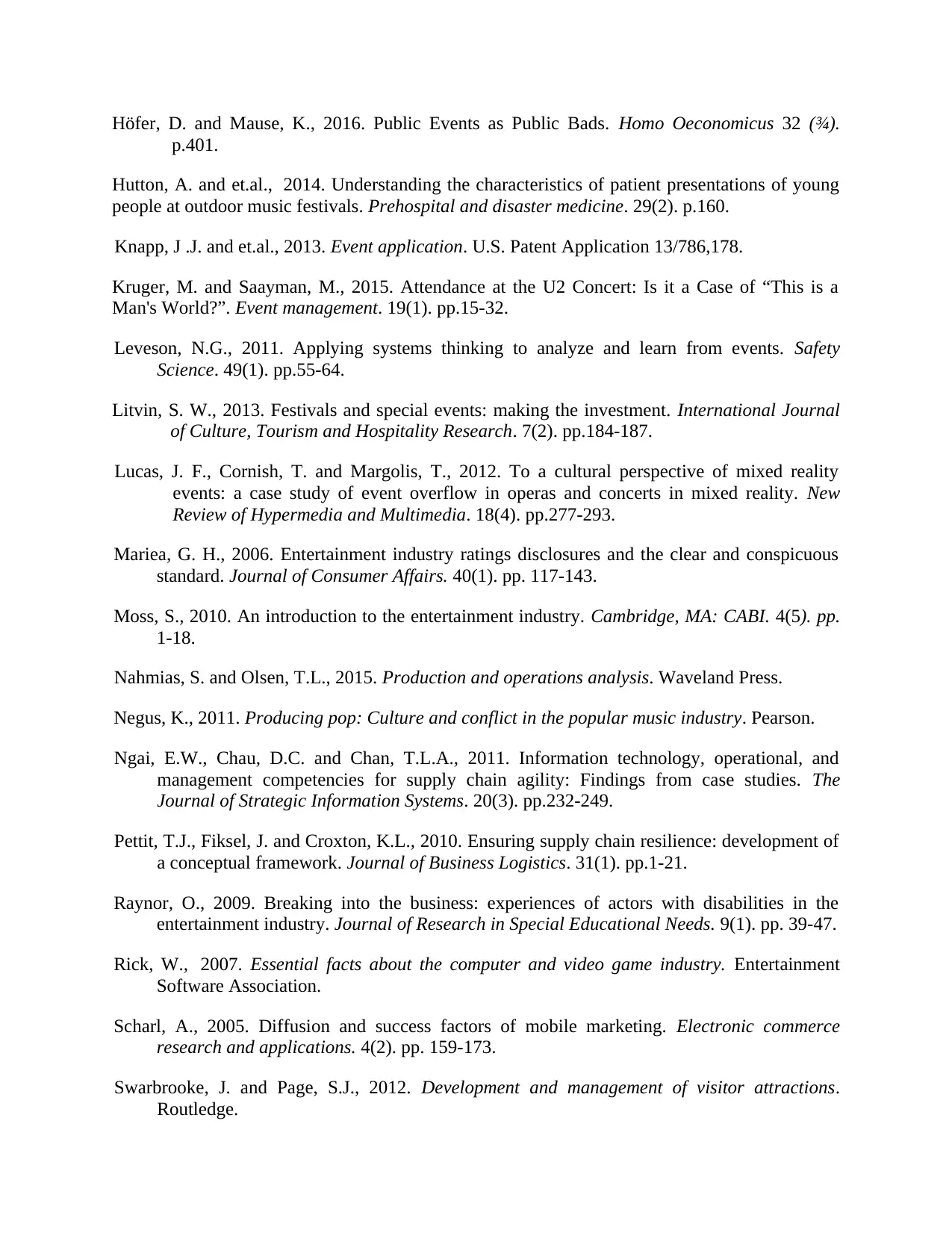
Höfer, D. and Mause, K., 2016. Public Events as Public Bads. Homo Oeconomicus 32 (¾).
p.401.
Hutton, A. and et.al., 2014. Understanding the characteristics of patient presentations of young
people at outdoor music festivals. Prehospital and disaster medicine. 29(2). p.160.
Knapp, J .J. and et.al., 2013. Event application. U.S. Patent Application 13/786,178.
Kruger, M. and Saayman, M., 2015. Attendance at the U2 Concert: Is it a Case of “This is a
Man's World?”. Event management. 19(1). pp.15-32.
Leveson, N.G., 2011. Applying systems thinking to analyze and learn from events. Safety
Science. 49(1). pp.55-64.
Litvin, S. W., 2013. Festivals and special events: making the investment. International Journal
of Culture, Tourism and Hospitality Research. 7(2). pp.184-187.
Lucas, J. F., Cornish, T. and Margolis, T., 2012. To a cultural perspective of mixed reality
events: a case study of event overflow in operas and concerts in mixed reality. New
Review of Hypermedia and Multimedia. 18(4). pp.277-293.
Mariea, G. H., 2006. Entertainment industry ratings disclosures and the clear and conspicuous
standard. Journal of Consumer Affairs. 40(1). pp. 117-143.
Moss, S., 2010. An introduction to the entertainment industry. Cambridge, MA: CABI. 4(5). pp.
1-18.
Nahmias, S. and Olsen, T.L., 2015. Production and operations analysis. Waveland Press.
Negus, K., 2011. Producing pop: Culture and conflict in the popular music industry. Pearson.
Ngai, E.W., Chau, D.C. and Chan, T.L.A., 2011. Information technology, operational, and
management competencies for supply chain agility: Findings from case studies. The
Journal of Strategic Information Systems. 20(3). pp.232-249.
Pettit, T.J., Fiksel, J. and Croxton, K.L., 2010. Ensuring supply chain resilience: development of
a conceptual framework. Journal of Business Logistics. 31(1). pp.1-21.
Raynor, O., 2009. Breaking into the business: experiences of actors with disabilities in the
entertainment industry. Journal of Research in Special Educational Needs. 9(1). pp. 39-47.
Rick, W., 2007. Essential facts about the computer and video game industry. Entertainment
Software Association.
Scharl, A., 2005. Diffusion and success factors of mobile marketing. Electronic commerce
research and applications. 4(2). pp. 159-173.
Swarbrooke, J. and Page, S.J., 2012. Development and management of visitor attractions.
Routledge.
p.401.
Hutton, A. and et.al., 2014. Understanding the characteristics of patient presentations of young
people at outdoor music festivals. Prehospital and disaster medicine. 29(2). p.160.
Knapp, J .J. and et.al., 2013. Event application. U.S. Patent Application 13/786,178.
Kruger, M. and Saayman, M., 2015. Attendance at the U2 Concert: Is it a Case of “This is a
Man's World?”. Event management. 19(1). pp.15-32.
Leveson, N.G., 2011. Applying systems thinking to analyze and learn from events. Safety
Science. 49(1). pp.55-64.
Litvin, S. W., 2013. Festivals and special events: making the investment. International Journal
of Culture, Tourism and Hospitality Research. 7(2). pp.184-187.
Lucas, J. F., Cornish, T. and Margolis, T., 2012. To a cultural perspective of mixed reality
events: a case study of event overflow in operas and concerts in mixed reality. New
Review of Hypermedia and Multimedia. 18(4). pp.277-293.
Mariea, G. H., 2006. Entertainment industry ratings disclosures and the clear and conspicuous
standard. Journal of Consumer Affairs. 40(1). pp. 117-143.
Moss, S., 2010. An introduction to the entertainment industry. Cambridge, MA: CABI. 4(5). pp.
1-18.
Nahmias, S. and Olsen, T.L., 2015. Production and operations analysis. Waveland Press.
Negus, K., 2011. Producing pop: Culture and conflict in the popular music industry. Pearson.
Ngai, E.W., Chau, D.C. and Chan, T.L.A., 2011. Information technology, operational, and
management competencies for supply chain agility: Findings from case studies. The
Journal of Strategic Information Systems. 20(3). pp.232-249.
Pettit, T.J., Fiksel, J. and Croxton, K.L., 2010. Ensuring supply chain resilience: development of
a conceptual framework. Journal of Business Logistics. 31(1). pp.1-21.
Raynor, O., 2009. Breaking into the business: experiences of actors with disabilities in the
entertainment industry. Journal of Research in Special Educational Needs. 9(1). pp. 39-47.
Rick, W., 2007. Essential facts about the computer and video game industry. Entertainment
Software Association.
Scharl, A., 2005. Diffusion and success factors of mobile marketing. Electronic commerce
research and applications. 4(2). pp. 159-173.
Swarbrooke, J. and Page, S.J., 2012. Development and management of visitor attractions.
Routledge.
Paraphrase This Document
Need a fresh take? Get an instant paraphrase of this document with our AI Paraphraser
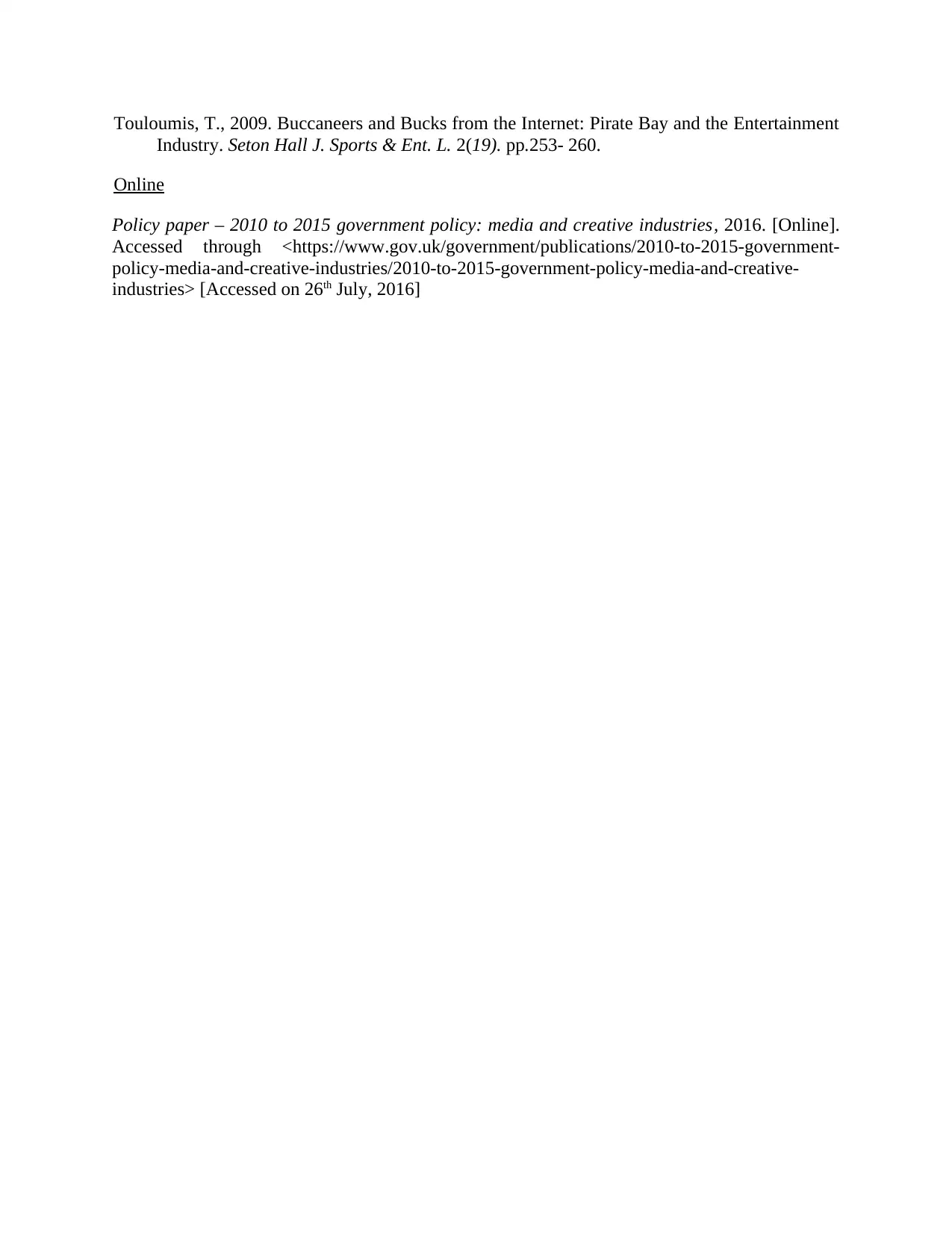
Touloumis, T., 2009. Buccaneers and Bucks from the Internet: Pirate Bay and the Entertainment
Industry. Seton Hall J. Sports & Ent. L. 2(19). pp.253- 260.
Online
Policy paper – 2010 to 2015 government policy: media and creative industries, 2016. [Online].
Accessed through <https://www.gov.uk/government/publications/2010-to-2015-government-
policy-media-and-creative-industries/2010-to-2015-government-policy-media-and-creative-
industries> [Accessed on 26th July, 2016]
Industry. Seton Hall J. Sports & Ent. L. 2(19). pp.253- 260.
Online
Policy paper – 2010 to 2015 government policy: media and creative industries, 2016. [Online].
Accessed through <https://www.gov.uk/government/publications/2010-to-2015-government-
policy-media-and-creative-industries/2010-to-2015-government-policy-media-and-creative-
industries> [Accessed on 26th July, 2016]
1 out of 11
Related Documents
Your All-in-One AI-Powered Toolkit for Academic Success.
+13062052269
info@desklib.com
Available 24*7 on WhatsApp / Email
![[object Object]](/_next/static/media/star-bottom.7253800d.svg)
Unlock your academic potential
Copyright © 2020–2025 A2Z Services. All Rights Reserved. Developed and managed by ZUCOL.





